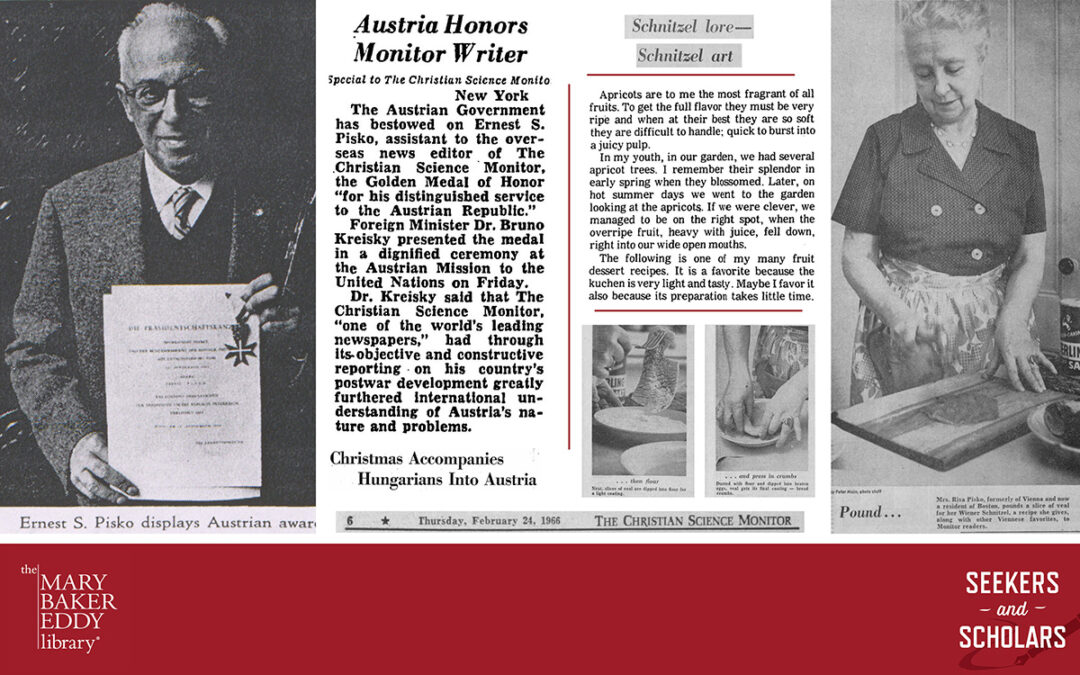What did it mean for a prominent Viennese journalist, and his family of Jewish heritage, to oppose the Nazi Party takeover of Austria prior to World War II? And what would that ultimately mean to The Christian Science Monitor? For Ernest Pisko, his wife Risa, and their daughter Sue, it meant imprisonment, forced marches, and exile from their country, before finding a new life and new purpose in the United States. To the Monitor, it meant hiring a writer with a sophisticated understanding of Central and Eastern European affairs, who would go on to win Austria’s highest award for his coverage of the country’s postwar development. Risa Pisko also contributed to Monitor readers’ understanding of Central Europe, publishing nearly 150 cooking recipes—often accompanied by stories and insights about her family background and Austrian-Hungarian culture. We talked with a slate of guests, including the Piskos’s grandson, to examine their story. In addition, this episode is interspersed with rich excerpts from their Monitor pieces, read aloud by our guests and host.
Access more on this topic—selected Monitor writings and recipes:
Ernest Pisko:
- “The Flower Shall Not Wither,” November 9, 1940
- “Never to Return,” November 30, 1940
- “Christmas Accompanies Hungarians Into Austria,” December 22, 1956
- “Austria Honors Monitor Writer,” September 29, 1962
Risa Pisko:
- “Crisp Apfelstrudel—’it rhymes with poodle’,” March 3, 1966
- “Delicious Tyrolean dumplings,” November 16, 1967
- “Fresh apricots are best when ripe-to-bursting,” August 7, 1975
 Dr. Eric Corty is the grandson of Ernest and Risa Pisko. He is Professor Emeritus of psychology and Director Emeritus of the School of Humanities and Social Sciences at Penn State Erie, The Behrend College. He is widely published on topics ranging from addictions and human sexuality to statistics, and the quality of his teaching won two awards. He holds fond memories of childhood visits to the Monitor with his grandfather, Ernest, and remembers being impressed with the clatter of the linotype machines and the speed with which giant rolls of paper moved through the presses. His grandmother, Risa, always baked cookies and cakes for him and his brother, Andy. He remembers quite clearly one visit from Risa, when she overruled his mother and fed the boys cake for breakfast. Risa also gave Eric his first cookbook—and taught him how to cook.
Dr. Eric Corty is the grandson of Ernest and Risa Pisko. He is Professor Emeritus of psychology and Director Emeritus of the School of Humanities and Social Sciences at Penn State Erie, The Behrend College. He is widely published on topics ranging from addictions and human sexuality to statistics, and the quality of his teaching won two awards. He holds fond memories of childhood visits to the Monitor with his grandfather, Ernest, and remembers being impressed with the clatter of the linotype machines and the speed with which giant rolls of paper moved through the presses. His grandmother, Risa, always baked cookies and cakes for him and his brother, Andy. He remembers quite clearly one visit from Risa, when she overruled his mother and fed the boys cake for breakfast. Risa also gave Eric his first cookbook—and taught him how to cook.
 Dr. Amy Carney is an Associate Professor of History at Penn State Behrend. As a modern German historian, her research—including her first book, Marriage and Fatherhood in the Nazi SS—focuses on family history. Her current project is a microhistory of two Jewish families: Walter, Helene, and Claude Corty, who emigrated from Cologne, Germany; and Ernest, Risa, and Sue Pisko, who emigrated from Vienna, Austria. She is very excited that this research will involve cooking, baking, and sharing Risa’s recipes with friends and family.
Dr. Amy Carney is an Associate Professor of History at Penn State Behrend. As a modern German historian, her research—including her first book, Marriage and Fatherhood in the Nazi SS—focuses on family history. Her current project is a microhistory of two Jewish families: Walter, Helene, and Claude Corty, who emigrated from Cologne, Germany; and Ernest, Risa, and Sue Pisko, who emigrated from Vienna, Austria. She is very excited that this research will involve cooking, baking, and sharing Risa’s recipes with friends and family.
 Kendra Nordin Beato is an award-winning staff writer and editor with the Monitor. In addition to food feature stories, her writing and editing has covered a wide range of subjects from the serious to the whimsical, from climate change to women’s progress in sports to a hedgehog hospital in England. It was during her tenure as the Monitor’s assistant editor of books and food that she developed her passion for food writing. She launched and managed a daily recipe blog called Stir It Up! that featured participating food bloggers. She earned a master’s in American studies from the University of Massachusetts, Boston, where her final project was titled “White Sauce: Race, Class, Gender and Boston’s Scientific Cooks in the Progressive Era.”
Kendra Nordin Beato is an award-winning staff writer and editor with the Monitor. In addition to food feature stories, her writing and editing has covered a wide range of subjects from the serious to the whimsical, from climate change to women’s progress in sports to a hedgehog hospital in England. It was during her tenure as the Monitor’s assistant editor of books and food that she developed her passion for food writing. She launched and managed a daily recipe blog called Stir It Up! that featured participating food bloggers. She earned a master’s in American studies from the University of Massachusetts, Boston, where her final project was titled “White Sauce: Race, Class, Gender and Boston’s Scientific Cooks in the Progressive Era.”
[Collage photos: Ernest Pisko, 1962. Risa Pisko and cooking demonstrations, 1966. © The Christian Science Monitor. Additional images used by permission.]



